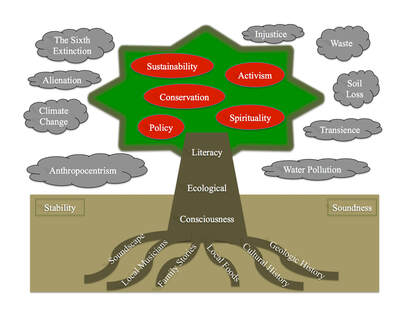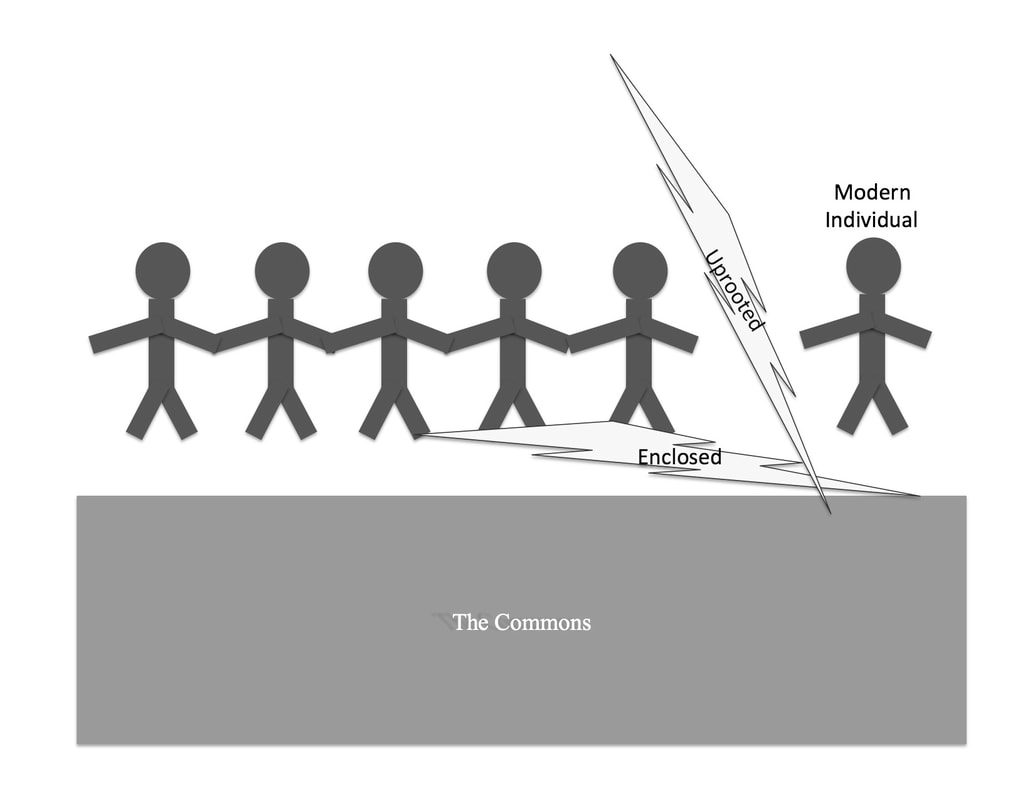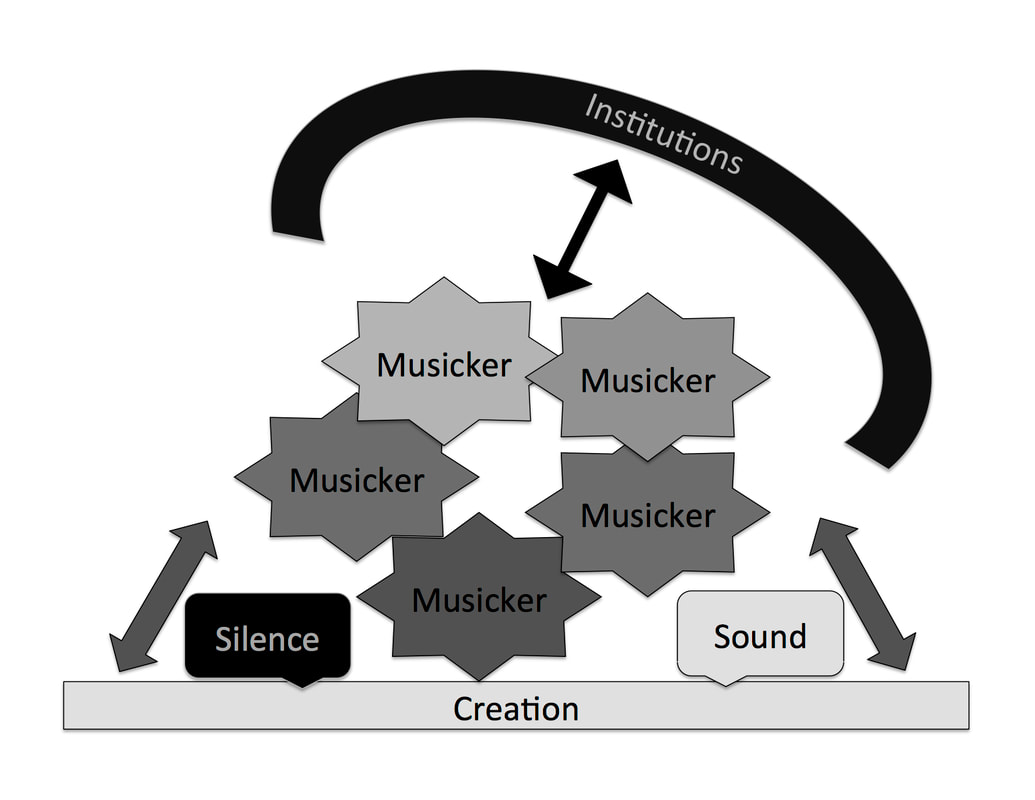
A black-and-white version of the image "The Essential Structure of Eco-Literate Music Pedagogy appears on Page 11 of my monograph. This tree is meant to represent the Self becoming ecological literate. The Self of the Music Teacher, the Self of the Student. Ultimately, the Self of any person. I argue, in my monograph, that understanding this structure will help a person become more ecologically literate.
At the trunk, you see three words: Ecological, and above it Literacy (that can be read directionally as "Ecological Literacy," moving upward in the Self tree), and below it Consciousness (that is "Ecological Consciousness," moving downward in the tree). In other words, if this tree is understood as a Self (yourself, or another person), Ecological Literacy is a reaching out from the Self toward more theoretical and/or active processes such as Sustainability, Activism, Conservation, Spirituality and Policy. For instance, Conservation is a theoretical position people take in which they attempt to conserve land by creating wilderness preservation, public natural parks, etc. Activism is seen often by people who have chosen to, as they say, take to the streets, to fight against practices as destructive, such as Tar Sands extraction, Nuclear Power Plants, Animal Abuse in Food Production, etc. These theoretical and/or active processes the fruits of the Self/tree in the image. Ecological Consciousness, our awareness of our emerging ecological Self, is fed by the roots of Soundscape, Local Musicians, Family Stories, Local Foods, Cultural History, and Geologic History. We become conscious of these experiences in a far less theoretical way than we experience the fruits of the tree. But knowing the way trees exist scientifically, like a tree, the Self is fed not only by the roots, but by the leaves and fruits too, so our personal philosophizing (theoretical) and activism (active) end up feeding the trunk (our Self), if in a different way than the roots. This list of fruits and roots, also, it not meant to be complete or comprehensive, but suggestive. You may recognize other roots and other fruits of the tree that are not mentioned, but fully fit the description and categorization of the current list.
Finally, the image also lists clouds, and soil. Under clouds there are such challenges as The Sixth Extinction, Alienation, Climate Change, Anthropocentrism, Injustice, Waste, Soil Loss, Transience, and Water Pollution. These are big things, external to ourselves, but which the results of which affect us much as the results of clouds (rain, blocking the sun, etc.) affects the health of a tree. For instance, when acid rain falls on the tree, it can negatively impact the leaves, fruit, and roots, and ultimately then the trunk. Similarly if we hold Anthropocentric bias, heatwaves caused by Climate Change, or drink polluted water, our ecological Self is negatively impacted.
To clarify, Alienation, as used in this book, is explained in the chapter "Philosophy on Soil." The image on page 32 "The Modern Individual, Enclosed and Uprooted" (included at the bottom of the blog) gives insight. Alienation occurs, in this context, when an individual experiences an enclosed commons (e.g., musics are copyrighted, land is privatized, food is difficult to find, etc.—here understanding Karl Marx’s historical criticism might be helpful; see his “Expropriation of the Agricultural Population from the Land”), and also when persons are uprooted from communities of people, who have lived together in place for many generations (for a critique of uprootedness in music education, see my publication “Music Educated and Uprooted”).
The idea of Transience is related to Alienation. To be transient is a state of “not lasting, enduring, or permanent. … lasting only a short time; existing briefly; temporary.” Modern professionals often live in a state of Transience, we move for employment and cut ties with family and friends from our childhood, which is the self-inflicted cause of Alienation for many, dissecting individuals from communities of people and the commons.
Two aspects of the soil in which our roots are fed (roots which lead to Ecological Consciousness, feeding the Self) identified in the text are Stability and Soundness. Stability, simply spoken, stands in resistance to Transience. We are stable in place when we reside (inhabit, dwell for a considerable time, abide, rest, make ourselves inherent to a place). Stability feeds our Self in the same way (but opposite) that ongoing professionalized Transience injures the Self. Even nomads, historically, aren’t Transient in the modern sense, visiting the same rivers, and deserts, and mountains, and valleys every single year of their lives, becoming familiar with place in the same way as those who dwell. Further analysis of the affects of unwanted Transcience on the Ecological Self, such as Transience experienced by climate refugees, and those fleeing war, is needed (see my blog post #54). The idea of Soundness is described especially beginning on page 101, the section “A Deep Ecology Musicking Spirituality.” Looking at the image on page 102 "A Spiritual Praxis" (included at the bottom of this blog post), Sound and Silence are the ground of Creation, on which Musickers stand, able to push away (resist) or allow in pressures and/or benefits offered by existing Institutions (schools, districts, national curricula, publishing companies, etc.). Soundness (that is the "ness" of Sound and Silence) is let in through our feet, much like the percussionist Evelyn Glennie hears music through her feet, as well as through our ears. Soundness cultivates the roots of our tree (and ultimately the Self) by being spiritually uplifting (or if poisoned soil, e.g., through noise, injuring the Self).
DS
"You don't get to choose how you're going to die. Or when. You can only decide how you're going to live. Now." ~Joan Baez
More in this blog:
See Post 54: What is a Climate Refugee, and Why Do They Matter to Teachers?


 RSS Feed
RSS Feed
